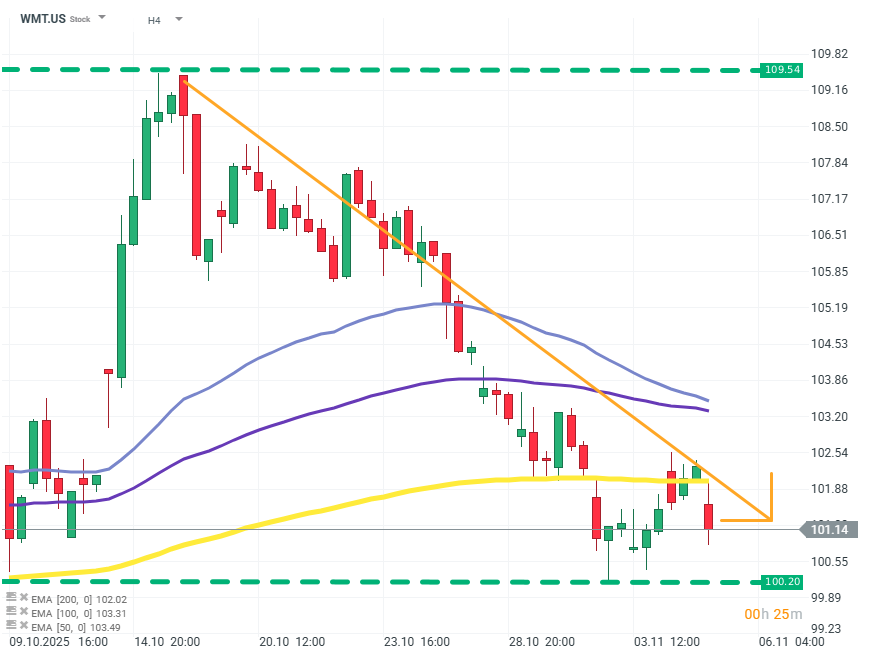The government shutdown currently ongoing in the United States, resulting from a budget bill dispute, has extended and officially become the longest in U.S. history. It has surpassed the previous 35-day shutdown, which also occurred under Donald Trump’s administration. The economic, financial, and social impacts are increasingly widespread in the economy.
The latest crisis resulting from the government shutdown is the issue with funding the “SNAP” program, or the “Supplemental Nutrition Assistance Program.” This program functions as a subsidy for food purchases for Americans who cannot feed themselves independently. Currently, the program covers 42 million people, which constitutes about 12% of the U.S. population.
The program was able to function for some time with reserves, but these have been depleted. The consequences of halting funding are much more severe than pushing a large portion of the population below the subsistence level. The SNAP program is a deeply embedded part of the American economy and society. Impressively, the SNAP program is one of the most efficient programs of its kind in the U.S. and worldwide.
- It costs about $100 billion annually, but each dollar of this program generates an estimated $1.5-1.8 in economic activity.
- Additionally, each billion dollars can sustain approximately 13,500 jobs.
The effects of suspending the program will ripple through the economy. The first victims will, of course, be the individuals covered by it. Secondly, companies and retail stores that actually made purchases under SNAP will feel the impact. This mainly includes Walmart and Kroger. SNAP payments account for several percent of all food expenditures in the U.S. For Walmart alone, this means a revenue drop of over $1.5 billion per month.
Significantly reduced sales in retail stores will lead to job cuts and create an economic downturn spiral in many communities. The same phenomenon will also put pressure on state budgets. The poorest states, where the economic situation is already bad, will feel the effects of these events much more acutely.
Since the market began to discount the suspension of SNAP payments, Walmart has lost over 7% of its valuation (over $57 billion in capitalization), and Kroger has lost simlar amount.
WMT.US (H4)

Source: xStation5
A closer look at the statistics and political positions of specific states and parties in the U.S. reveals a form of fundamental dysfunction in the American system and helps understand why the shutdown continues despite obvious and increasingly serious economic consequences.
Primarily, the Republican Party, which currently controls most significant offices in the U.S., advocates fighting against most forms of social security. Every day that benefits and subsidies are not paid is considered a success in itself by the GOP.
What escapes many commentators, especially outside US, is the fact that the mentioned social support is mainly dependent on poor states, which are predominantly Republican states. States voting for Democrats are, on average, much wealthier and less dependent on benefits, and state governments have a range of reserves and initiatives in place of SNAP payments.
The material on this page does not constitute financial advice and does not take into account your level of understanding, investment objectives, financial situation or any other specific needs. All information provided, including opinions, market research, mathematical results and technical analyzes published on the Website or transmitted To you by other means, it is provided for information purposes only and should in no way be construed as an offer or solicitation for a transaction in any financial instrument, nor should the information provided be construed as advice of a legal or financial nature on which any investment decisions you make should be based exclusively To your level of understanding, investment objectives, financial situation, or other specific needs, any decision to act on the information published on the Website or sent to you by other means is entirely at your own risk if you In doubt or unsure about your understanding of a particular product, instrument, service or transaction, you should seek professional or legal advice before trading. Investing in CFDs carries a high level of risk, as they are leveraged products and have small movements Often the market can result in much larger movements in the value of your investment, and this can work against you or in your favor. Please ensure you fully understand the risks involved, taking into account investments objectives and level of experience, before trading and, if necessary, seek independent advice.







